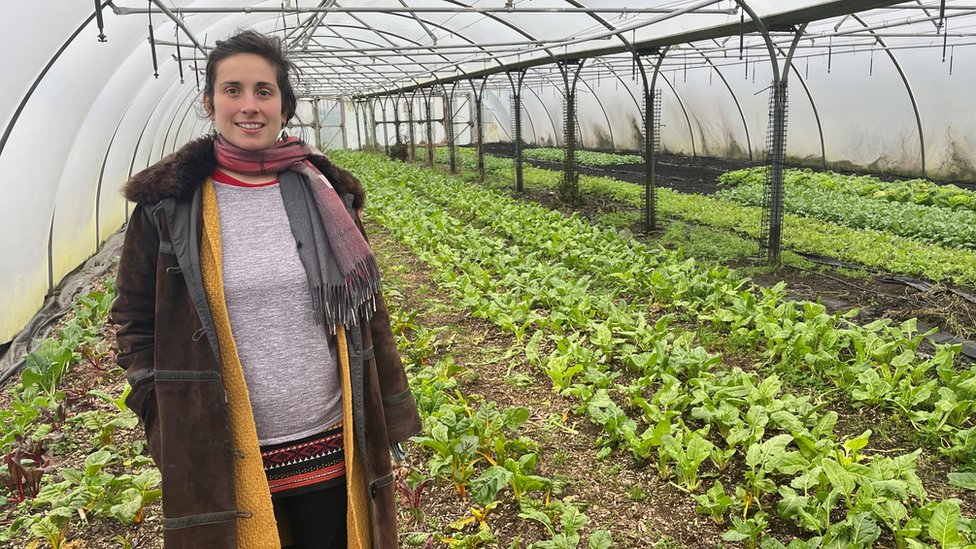The Tyddyn Teg cooperative grows organic vegetables for the community
A cooperative that sells food to local families could help develop a template to make farming in Wales greener.
Tyddyn Teg near Caernarfon in Gwynedd grows organic vegetables for the community and tries to be environmentally friendly.
It uses no pesticides, which are said to help biodiversity thrive.
It comes as a new bill that could transform the way farming works in Wales is due to be debated by the Welsh Government on Tuesday.
Each week, Tyddyn Teg sells 170 boxes of groceries to local families.
The farm shop sells homemade bread and food from other producers.
Sally Mees from the farm said it was useful for people to know where their food came from.
The 44-year-old said: “Customers can see that we are harvesting vegetables straight from the ground into the store.”
Ms Mees, who runs the nursery, said only a small part of the land was farmed.
Sally Mees from the farm said it was useful for people to know where their food came from
“The rest is wetland, woodland and teeming with life,” she said.
Aglaé Bindi, 31 and originally from France, manages the cooperative’s accounts and shop.
Reducing the use of machines and employing more people for agriculture is “a major challenge”.
“We have to be careful about where we spend and we do have financial problems sometimes,” said the mother-of-one.
“To meet these challenges we need to have more of these places, so I think encouraging them is a good thing, but it starts with acknowledging that those who are doing this at the moment are struggling.
Before Brexit, agricultural policy was decided in Brussels as part of the Common Agricultural Policy.
It rewarded landowners for the amount of land they had, regardless of how it was farmed.
The new Farm Bill, the first designed specifically to meet the needs of Wales, could herald a change in the way Wales is farmed – with more emphasis on sustainable agriculture than maximizing food production.
Aglaé Bindi said reducing the use of machinery on the farm is ‘a major challenge’
Currently, the bill requires farmers to “conserve and enhance” the environment and biodiversity in order to qualify for subsidies.
The World Wide Fund for Nature Cymru (WWF) wants the Welsh Government to go further.
WWF Cymru said the bill should aim to “restore” the natural environment, in line with the ambitions of last year’s COP15 conference in Montreal.
WWF Cymru’s Alex Phillips said: “It is time to put this straight into Welsh legislation to ensure this new law is as strong as possible.”
Farmers’ associations said that environmental sustainability depends on economic sustainability.
Rhodri Jones, fourth generation hill farmer, raises local cows and sheep at Llanuwchllyn, in Gwynedd.
For 30 years, his farm called Brynllech has been involved in environmental projects.
The latest is Glastir, a Welsh Government scheme that compensates farmers for less-intensive farming.
A mountain on the farm is not grazed as it is a Site of Special Scientific Interest and the hedges are wide to encourage birds.
“A lot of work has gone into these environmental programs and we want to continue with that and improve on what’s here,” said Mr Jones, 45.
Farmer Rhodri Jones said sustainability must be economically feasible
But sustainability and profitability, he said, go hand in hand.
“We are committed to net zero policy, but at the end of the day we must continue to produce the wonderful food that we produce for the country,” Mr Jones said.
“It has to be environmentally and financially sustainable.
“Otherwise we are not here and there is nobody who takes care of what we have.”
Funding from Glastir is due to end at the end of this year, but the new Sustainable Farming Scheme, part of the Farm Bill, is not due to come into force until spring 2025.
NFU Cymru warned that the work, which has been carried out for over three decades, is in jeopardy as the Welsh Government has not committed to extending Glastir by then.
Rural Affairs Committee chair Hedd Pugh said: “(Farmers) could be forced to move more livestock up into the mountains or open the gates around areas where trees have been planted.
“The farms need to be viable and it is so important that the Welsh Government recognizes that. There has to be a payment and the Glastir program (should) continue until the new program starts in 2025.”
Hedgerows were widened on his farm to encourage bird life
The Welsh Government said: “Our first-ever Welsh Farm Bill paves the way for ambitious and transformative legislation to support farmers and sustainable food production, and to preserve and enhance the Welsh landscape, culture and language.
“One of the goals of the bill is to maintain and improve the resilience of ecosystems and the benefits they provide. This is in line with the objective of the Environment (Wales) Act.”
It said Glastir would last until December 2023 and future support for the program would be considered.
Stability payments, it said, would be a feature of the Sustainable Farming Scheme throughout Senedd’s tenure and beyond.
Don’t miss interesting posts on Famousbio










